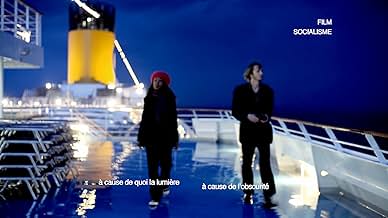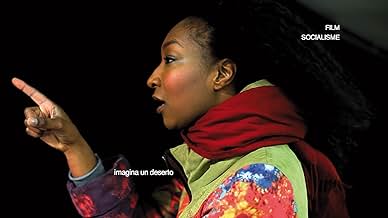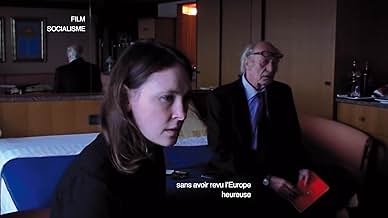Film socialisme
- 2010
- Tous publics
- 1h 42m
IMDb RATING
5.7/10
3K
YOUR RATING
The passengers on a Mediterranean cruise enjoy their luxuries as a small family struggles with overbearing media attention.The passengers on a Mediterranean cruise enjoy their luxuries as a small family struggles with overbearing media attention.The passengers on a Mediterranean cruise enjoy their luxuries as a small family struggles with overbearing media attention.
- Awards
- 5 wins & 2 nominations total
Agatha Couture
- Alissa (segment "Des choses comme ça")
- (as A. Couture)
Mathias Domahidy
- Mathias (segment "Des choses comme ça")
- (as M. Domahidy)
Quentin Grosset
- Ludovic (segment "Des choses comme ça")
- (as Q. Grosset)
Maurice Sarfati
- (segment "Des choses comme ça")
- (as M. Sarfati)
Nadège Beausson-Diagne
- Constance (segment "Des choses comme ça")
- (as N. Beausson)
Dominique Devals
- (segment "Des choses comme ça")
- (as D. Devals)
Marine Battaggia
- Florine "Flo" Martin (segment "Quo vadis Europa")
- (as M. Battaggia)
Featured reviews
We recently screened Godard's contentious "Film Socialisme" at a small art-house cinema in Boulder, CO where I live and I couldn't be more delighted by the response. Namely, there were many people who were infuriated about the film, leaving in droves and upset that such a film both exists and/or would be shown at said theater (the only art-house theater in the city, actually).
One patron was even angry enough to leave a note behind for the concessions stand stating that she "speaks French" and was particularly upset about the subtitles of the film. She'd probably be the kind of person to get upset about the "punctuation problems" in ee cummings' poems. And don't get her started on Andy Kaufman!
First and foremost, "Film Socialisme" is without a doubt a beautiful film. The way in which it was shot and edited is visionary, a true patchwork of modern/post-modern society/cinema today. The kind of film that -- as with the majority of Godard's ouevre -- may be ahead of its time but will certainly be enjoyed by sincere cinephiles looking for something new, bold and fresh. Beyond any sense of provocation, there were true moments of visual/audio splendor that simply cannot be seen anywhere else (by sheer merit of the fact that, yes I agree, no one else would be "allowed" to make/distribute such a film; and that in itself is important when considering whether or not you should spend the money/time on seeing it in the theater).
Clearly, the subtitles of the film -- which are minimalist and fractured (clearly intentionally) - - are a play on one of the film's many themes: the breakdown of communication and language (think Gertrude Stein texting you viz. her thoughts on modern society). That people are growing angry about the challenging and innovative way Godard has aptly chosen to play even now with the very subtitles of his film is extremely exciting. Not to mention the fact that, again, aside from the "gimmick," the subtitles become a poetic innovation unto themselves in which Godard combines words into fascinating portmanteaus that invoke clever wordplay a la some of the greater avant-garde/surrealist literature.
He has finally gone that extra distance in deconstructing every aspect of the film (including, at times, a brilliant dalliance with the audio mix that clearly has confounded viewers a la similar experiments by the likes of the Velvet Underground, Andy Warhol, Andy Kaufman and La Monte Young; there are moments in which you truly wonder whether or not there is an "actual" breakdown of the film being shown -- especially if you're lucky enough to see this film through digital projection; "Is there something wrong with the disc?! Oh no!!" Very exciting. Audience interaction, indeed!)
Ultimately and as per Godard's typical (?) MO, the film is a firm lashing of the perpetuated bourgeois culture (particularly in America; hence his giving us the finger for not knowing French or the many other languages interspersed throughout the polyglot film; "You don't want to learn another language? Fine. Try figuring THIS out!!")
Like Lenny Bruce and a younger John Waters, with "Film Socialisme" Godard is shaking up audience members -- particularly his "greatest fans" -- by provoking them in ways they may not be comfortable with, in ways that may simply repel them. "You want to be shocked? I'll shock you, but be prepared to be, well c'mon: shocked." We don't go to Godard films to watch a clear narrative or to understand everything that happens. It's poetry, it's visual/audio artistry, it's -- ultimately -- play and experimentation. And Godard has once again succeeded in creating something that will not allow us to remain static in our seats. If you can't handle that, he is saying as always, then feel free to leave and don't forget to ask for a refund on your way out.
The megaplex is right down the street. Or, hey, buy a copy of "Breathless" and watch a nice "really weird and wild!!!!" noir film with a plot. It's all up to you!
In the end, the film defies quotation marks. If you want "challenging," you've got plenty of it on Netflix. If you want challenging, however, see "Film Socialisme." Just don't be too upset if it... challenges you.
One patron was even angry enough to leave a note behind for the concessions stand stating that she "speaks French" and was particularly upset about the subtitles of the film. She'd probably be the kind of person to get upset about the "punctuation problems" in ee cummings' poems. And don't get her started on Andy Kaufman!
First and foremost, "Film Socialisme" is without a doubt a beautiful film. The way in which it was shot and edited is visionary, a true patchwork of modern/post-modern society/cinema today. The kind of film that -- as with the majority of Godard's ouevre -- may be ahead of its time but will certainly be enjoyed by sincere cinephiles looking for something new, bold and fresh. Beyond any sense of provocation, there were true moments of visual/audio splendor that simply cannot be seen anywhere else (by sheer merit of the fact that, yes I agree, no one else would be "allowed" to make/distribute such a film; and that in itself is important when considering whether or not you should spend the money/time on seeing it in the theater).
Clearly, the subtitles of the film -- which are minimalist and fractured (clearly intentionally) - - are a play on one of the film's many themes: the breakdown of communication and language (think Gertrude Stein texting you viz. her thoughts on modern society). That people are growing angry about the challenging and innovative way Godard has aptly chosen to play even now with the very subtitles of his film is extremely exciting. Not to mention the fact that, again, aside from the "gimmick," the subtitles become a poetic innovation unto themselves in which Godard combines words into fascinating portmanteaus that invoke clever wordplay a la some of the greater avant-garde/surrealist literature.
He has finally gone that extra distance in deconstructing every aspect of the film (including, at times, a brilliant dalliance with the audio mix that clearly has confounded viewers a la similar experiments by the likes of the Velvet Underground, Andy Warhol, Andy Kaufman and La Monte Young; there are moments in which you truly wonder whether or not there is an "actual" breakdown of the film being shown -- especially if you're lucky enough to see this film through digital projection; "Is there something wrong with the disc?! Oh no!!" Very exciting. Audience interaction, indeed!)
Ultimately and as per Godard's typical (?) MO, the film is a firm lashing of the perpetuated bourgeois culture (particularly in America; hence his giving us the finger for not knowing French or the many other languages interspersed throughout the polyglot film; "You don't want to learn another language? Fine. Try figuring THIS out!!")
Like Lenny Bruce and a younger John Waters, with "Film Socialisme" Godard is shaking up audience members -- particularly his "greatest fans" -- by provoking them in ways they may not be comfortable with, in ways that may simply repel them. "You want to be shocked? I'll shock you, but be prepared to be, well c'mon: shocked." We don't go to Godard films to watch a clear narrative or to understand everything that happens. It's poetry, it's visual/audio artistry, it's -- ultimately -- play and experimentation. And Godard has once again succeeded in creating something that will not allow us to remain static in our seats. If you can't handle that, he is saying as always, then feel free to leave and don't forget to ask for a refund on your way out.
The megaplex is right down the street. Or, hey, buy a copy of "Breathless" and watch a nice "really weird and wild!!!!" noir film with a plot. It's all up to you!
In the end, the film defies quotation marks. If you want "challenging," you've got plenty of it on Netflix. If you want challenging, however, see "Film Socialisme." Just don't be too upset if it... challenges you.
Can we all get over the "challenging" provocations that this Film attempts to offer. Forgive a potential Agism, but in the spirit of class conscious critique: This is a sign of late Godard, complicit in his Bourgeois canonization, making ineffectual meditations on a a medium already robust, ubiquitous and politically affective. I'm speaking of course about Video. A previous reviewer mentioned Ryan Tracartin - This film is at least 20 years behind Ryan Trecartin's most trivial undergrad work. Godard mobilizing the distancing, alienating politics of a pseudo-left closeted Eurocentrist in order to promulgate a consistent dominance over "Art House" cinema. Honestly what the blood is this film? a further denigration of the kinds of education received in low income areas of the United States, Northern Africa, Southeast Asia and Eastern Europe? Who is this this film standing up for? and if it stands up for no one then why is this nihilism necessary? The fractured subtitles are absolutely insulting - There is no transformative translation ala Benjamin, no generative deconstruction, no Stein, no Saurraute , no performative language at all - we are left with nothing but masturbatory sloganism (and not a kind of sloganism which implodes on itself in order to critique a contemporary state of language, rather a sloganism which, with full self awareness, alienates all those accept for the most privileged, most geographically/economically/culturally entitled). This film is no "challenge" to its audience as the audience for late Godard is ALREADY educated, already leftist (or at least conventionally Liberal) already enlightened as to the ornate delicacies of high cinema and already aware of and experienced with cultural forms outside of the myopic mainstream. Therefore, this film seems unnecessarily difficult, a poorly informed cloying attempt at relevance in a digital age. The Film says nothing about its medium other than a tired Brechtian breaking of verisimilitude at the beginning (a fruitless technique, as video implicitly points to its own making(s) given its unmistakable and highly recognizable fidelity) and is years behind even the most the primitive works of contemporary video art. It seems Godard did not realize the impact that Histoire(s) du cinema had on the rest of the world, and that the rest of the world has taken something he helped to pioneer and ran far far away from beyond it. I can't help but feel that Harun Farocki already made this film in the 80s and it was far more innovative, "challenging", inclusive and all around less insulting than this ultimately apolitical irreverency. There is nothing about identity in this film and an absolute disregard for the filmmaker's own place of power in the discursive grid (ie, heterosexual, white, wealthy, Western, mutilingual, gendered male).
to the reviewer who in response to the fractured subtitles said "you should learn French!" - maybe in another lifetime free of inhibitory systemic inhibitors, financial constraint and economic-racial-historical determinism we could all take up this task of Eurocentric cultural Enlightenment, but for now I'll settle for at least a concession of legibility.
to the reviewer who in response to the fractured subtitles said "you should learn French!" - maybe in another lifetime free of inhibitory systemic inhibitors, financial constraint and economic-racial-historical determinism we could all take up this task of Eurocentric cultural Enlightenment, but for now I'll settle for at least a concession of legibility.
I'll admit that I've only seen a handful of Jean-Luc Godard's movies. "Film socialisme" is the latest. Very bizarre movie. In fact, it doesn't really emphasize a plot. It's hard to tell what the movie's emphasis is supposed to be, with the focus on a group of people aboard a cruise ship in the Mediterranean. Maybe Godard wanted to address the use of certain places as tourist meccas, but I couldn't be certain. With current events in the world, it's probably significant that the movie includes Palestine.
I'd like to see the rest of Godard's movies, but I doubt that I'll ever be able to truly understand what sort of point he was trying to make with this one.
Watch for singer-songwriter Patti Smith in a brief appearance.
I'd like to see the rest of Godard's movies, but I doubt that I'll ever be able to truly understand what sort of point he was trying to make with this one.
Watch for singer-songwriter Patti Smith in a brief appearance.
It was eagerly awaited for years,the trailer which was the whole film in fast motion looked ravishing, and it seemed as if in this,perhaps his last film,Godard would deliver his final testament,a summation of all the themes which have run through his work for the last fifty years.From the beginning it looks absolutely stunning.In its high def cinematography the colours are gorgeous,the Mediterranean setting recalling that of Le Mépris ,but whereas the latter film was a profound meditation on European culture and civilisation,here the characters spout banal platitudes about politics or philosophy as the ship sails along past various cities; in the Spanish section there is a scene of a bullfight,in the Italian section a clip from a Rossellini film,it's that predictable.
In the final section the film switches to one of Godard's favourite subjects,the daily routine of a family with young children who run a petrol station and have for no apparent reason a pet llama.Here finally the film shows some kind of rapport with its characters but it is already too late.Yet despite its faults it still exhibits all the hallmarks of Godard's style,the brilliance of his framing and editing,the crucial way sound plays against image,but the feeling persists that perhaps he has no longer anything to say.
In the final section the film switches to one of Godard's favourite subjects,the daily routine of a family with young children who run a petrol station and have for no apparent reason a pet llama.Here finally the film shows some kind of rapport with its characters but it is already too late.Yet despite its faults it still exhibits all the hallmarks of Godard's style,the brilliance of his framing and editing,the crucial way sound plays against image,but the feeling persists that perhaps he has no longer anything to say.
Jean-Luc Godard is a reference in cinema and changed the art fifty years ago with a unique challenging style that defied current esthetics and etiquette.
His latest work can be described more as an eclectic experiment than any enduring piece of cinema, but it serves to show his mastery of the art and his ability to dissect it in its most basic components before trying to create a different, distinct experience for the viewer. He plays with themes, locations, styles and intermingles with little restriction photos, videos, ambient sounds, silence, music, narrations, monologues, dialogues to delves into a dream-like undefined cinematic discussion.
The film does not quite work as a whole, precisely from this lack of focus, but some of the imagery (some sharp and some out of focus, some old and some new, some seemingly meaningless and some full of allegories, etc.), dialogues (existential, simple, social, revolutionary) and intertitles do reach a cord and will be remembered subconsciously or consciously. It's lack of clear content or continuity should not take away from it's task of deconstruction and desire to destabilise our current comforts. In that aspect, Godard grabs the rug under conventional cinema and pulls very hard to make it topple over dumbfounded and confused.
There are three segments, each shorter than the previous, but besides being glad to finally leave this seemingly derelict boat and to briefly know a fictional philosophising family, there is not enough distinction between the segments to warrant further feedback at this point. Only that as Godard's life perhaps, and exemplified in the crafty ancient time-telling device in segment #2, time is getting shorter...
Maybe we'll get it right some day, may be one of many messages of this remue-méninges.
His latest work can be described more as an eclectic experiment than any enduring piece of cinema, but it serves to show his mastery of the art and his ability to dissect it in its most basic components before trying to create a different, distinct experience for the viewer. He plays with themes, locations, styles and intermingles with little restriction photos, videos, ambient sounds, silence, music, narrations, monologues, dialogues to delves into a dream-like undefined cinematic discussion.
The film does not quite work as a whole, precisely from this lack of focus, but some of the imagery (some sharp and some out of focus, some old and some new, some seemingly meaningless and some full of allegories, etc.), dialogues (existential, simple, social, revolutionary) and intertitles do reach a cord and will be remembered subconsciously or consciously. It's lack of clear content or continuity should not take away from it's task of deconstruction and desire to destabilise our current comforts. In that aspect, Godard grabs the rug under conventional cinema and pulls very hard to make it topple over dumbfounded and confused.
There are three segments, each shorter than the previous, but besides being glad to finally leave this seemingly derelict boat and to briefly know a fictional philosophising family, there is not enough distinction between the segments to warrant further feedback at this point. Only that as Godard's life perhaps, and exemplified in the crafty ancient time-telling device in segment #2, time is getting shorter...
Maybe we'll get it right some day, may be one of many messages of this remue-méninges.
Did you know
- TriviaThe film did not include traditional English language subtitles for releases in countries that spoke such language. Instead, the subtitles were in "Navajo English", a translation that baffled many critics and audience members.
- GoofsSomeone claims that Napoleon founded the Comédie-Française in 1812 in Moscow. Actually, it was founded in 1680 by Louis XIV.
- Quotes
Rebecca (segment "Des choses comme ça"): [dialogue continuity] You're absolutely right: I don't love any "people." Not French, not North American, not German. Not Jewish people, not black people. I love only my friends... When there are any.
- ConnectionsEdited from Le cuirassé Potemkine (1925)
- SoundtracksMamita mia
Performed by Ernst Busch
- How long is Film socialisme?Powered by Alexa
Details
- Release date
- Countries of origin
- Official site
- Languages
- Also known as
- Film Socialism
- Filming locations
- Production companies
- See more company credits at IMDbPro
Box office
- Gross US & Canada
- $42,925
- Opening weekend US & Canada
- $4,526
- Jun 5, 2011
- Gross worldwide
- $222,079
Contribute to this page
Suggest an edit or add missing content
























